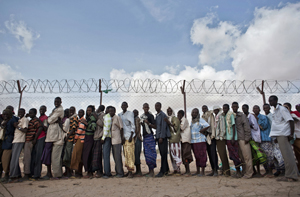AL-SHABAB’S EXIT LENDS POSSIBLE RECOVERY CHANCE
Somalia is a war torn country overrun by war lords, clans and the Shabab. Since 2006, the country has faced the occupancy of Al Shabab, an Islamic militant group, that has about 40-militia in Somalia; they occupy the majority of the South.
In 2007 the Shabab claimed ties to Al Qaeda, and engage in many Al Qaeda-type practices including stoning, cutting off hands, the banning of bras and music.
While a transitional government is in place, it has not found a way to stop the insurgents or mobilize the people because of the suppressive rule of the Shabab. In August, the Shabab abruptly announced they were pulling out of Mogadishu, the capitol.
This gives the opportunity for the transitional government to try and unite themselves and their people. However, the evacuation of the Shabab has done much the opposite. Different clan and militia groups, such as, Ahlu Sunna Wal Jama’s, who have control of several towns in central Somalia, are scrambling for power and the transitional government leaders are ineffectual and divided.
A suicidal car bombing took place just outside a government compound on Oct. 18, in one of the few neighborhoods the transitional government controls. It did not hurt the compound but killed four people, and could foreshadow a comeback of the Shabab after several months of losing ground to the 9,000 strong African Union, a peacemaking militia.
The United Nations records show foreign governments have together invested millions of dollars to help Somali people recover. However, Somalia’s corrupt government has kept it from the people.
According to the United Nations tens of thousands of people have died in Somalia due to starvation and up to 750,000 could starve to death in the coming months.
Adding to the Somalia’s list of complexities, on Oct. 18, Kenyan forces entered Somalia to fight the Shabab. Kenya declared Al Shabab was too much of a threat to their country to not intervene in Somalia. The Somali government signed a communique with Kenyan delegates stating that the Shabab was a threat to both countries. Whether or not Somalia’s griefs will continue to escalate with the entrance of Kenya remains a question.
OCCUPY WALL STREET MOVEMENT GAINS MOMENTUM
“We are 99 percent,” is a slogan being used by the Occupy Wall Street movement’s protesters to express the hatred of corporate greed, government bailouts and the unchecked power of Wall Street and Washington.
The Occupy Wall Street movement is horizontally organized, or based on the common views of people. The movement had its first protest on Sept. 17, in Liberty Plaza in New York, New York; approximately 2000 people rallied.
The movement looks to the Arab Spring as a model for rebelling against government authority and standing up for what “99 percent” of Americans desire. Like Arab Spring, protests are being organized through Facebook, Google calendar and other social media networks and websites.
Participants of Occupy Wall Street believe the state and corporations are corrupting power. Citizens need more freedom, and equality has been compromised expressly because one percent of the population holds 47 percent of the wealth. Critics say the movement needs goals and leaders to create a substantial platform to stand on.
The movement has gone global and taken place in 82 countries. The most recent local rally was on Oct. 15 and circled downtown Orlando, including a stop at City Hall.
Today at 7 p.m. Eastern Time, there will be a “General Assembly” held again in Liberty Plaza in New York City to educate others about Occupy Wall Street’s beliefs and explain to protesters ways to spread the movement.
HAITI STRUGGLES TO REBUILD
Haiti’s infrastructure and government continue to be in a constant stalemate after the devastating earthquake Jan. 10, 2010, costing more than 250,000 lives.
The 2010 earthquake, the worst one in the region in 200 years, reduced capitol Port-au-Prince to mere rubble. Currently, 600,000 Haitians still live in refugee camps while the rebuilding of the city has been slowed by political conflict.
American envoy former, President Bill Clinton, has been working with new Haitian Prime Minister Garry Conille to end months of political gridlock and focus on improving the environment, job creation, state of law, energy and education.
Despite good intentions, Haiti faces barriers to rebuilding. In addition to bureaucratic problems, the cholera epidemic, which began in November 2010, has evolved to encompass 470,000 cases, killing 6,600, according the United Nations.
By MARK VAGELAKOS
GREEK DEBTS PILE UP
Nearly a year after Greece’s financial collapse, the classic behemoth is drowning in nearly $400 billion of international debt and impossible austerity payments from European loans.
The crisis stems from low interest loans Greece has taken out over the past decade. However, these loans could not be paid back after the global monetary collapse of 2009 when Greece’s economy crashed. Now the country relies on international support to bail out its economy but it is struggling to make payments on the borrowed funds.
Prime Minister George Papandreou is attempting to reduce the deficit with unpopular property taxes and public worker pay cuts and layoffs.
European donors have brokered a larger deal, giving Greece three years to catch up to its debt. However, Greek officials will still need to increase taxes, causing countrywide protests and large shifts in political party preferences.
//
